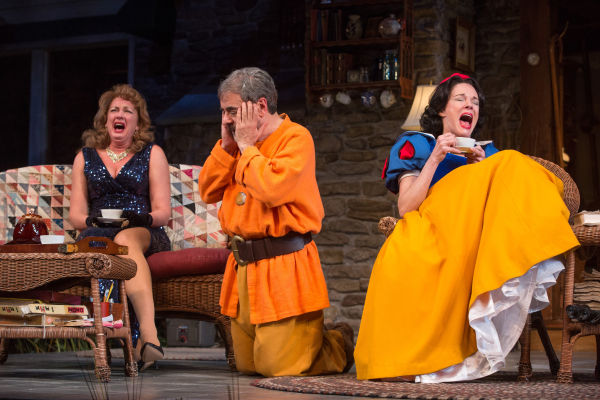Vanya and Sonia and Masha and Spike

(© Matthew Murphy)
In 2013, Christopher Durang's Tony-winning homage to Anton Chekhov, Vanya and Sonia and Masha and Spike, became theater lovers' favorite family comedy. Three siblings cavort around an estate with romantic and financial drama hanging over the property like a thick fog. Throw in some Disney costumes and a Three Sisters quote and everyone's comic tastes — both high- and lowbrow — are more than appeased. The amiable farce has now made its way to New Jersey's Paper Mill Playhouse, where it continues to boast Durang's sharp wit and pointed commentary about the emptiness that plagues our lives (or at least the lives of depressed Russians). The company of actors, unfortunately, has yet to find the comic heartbeat that ties these sorry characters together as one bemoaning family unit.
Mark Nelson and Michele Pawk — our first two title characters, Vanya and Sonia — are the sullen faces to welcome us to their lovely country home, located in exotic Bucks County, Pennsylvania (a striking stone farm house designed by David Korins). They no longer have ailing parents to care for, so it's just another tedious a.m. in "the morning room" where the siblings can grumble about how their scholarly parents burdened them with names of Anton Chekhov’s characters.
Vanya sits in his wicker chair sipping a cup of coffee that he, for once, poured himself, to the dejected dismay of his adopted sister, Sonia, who lives for the daily ritual of pouring his cup. The change in routine is so profound it sends Sonia into a dramatic tailspin, quoting lines from The Seagull, until she remembers to tell her brother that their long-absent movie-star sister Masha (Carolyn McCormick) will be arriving shortly. The surprise for them both, as well as for their clairvoyant cleaning lady Cassandra (a Greek tragedy spouting Gina Daniels), is that Masha is bringing along her new hunky beau, Spike (Philippe Bowgen), who, as Vayna points out, "looks ten."
Masha has managed to nab the role of family breadwinner, and in the process, escaped the tedious trappings of the Bucks County home. While Vanya and Sonia's lives have slowly atrophied at the homestead, Masha has been out in Hollywood, paying their mortgage — though she may not be for long.
McCormick, with her chiseled features, long elegant limbs, and flowing brown locks, is the picture of Hollywood perfection and superficiality. This aura is particularly radiant beside Pawk, whose bedraggled Sonia wraps herself in a baggy sweater, and, like a resident of Grey Gardens, seems shell-shocked by anything that has touched the outside world. Consequently, the collective family outing to a swanky costume party, hosted by Masha's famous friends, is particularly life-altering for Sonia. In a surge of independence, she forgoes her assigned outfit to finally one-up her glamorous sister. A tiff that ensues finds costume designer Leon Dobowski's sequined gowns in a head-to-head faceoff with Snow White…who ends up being short a few dwarves.
It doesn't take this parade of flamboyant costumes to register the exaggerated sensibilities Durang writes into his family of oddballs. Yet the company, as directed by Don Stephenson, is too broad for its own good, losing the characters' endearing layers within their inflated personas. Pawk relishes in Sonia's momentary transformation from house frau to elegant belle of the ball, but each colorful persona seems to be its own entity, winning laughs in the moment but lacking a core identity that bridges the two. We see glimmers of this bridge in her poignant Act 2 monologue — a joyful conversation with a gentleman caller she seems to have charmed at the party the night before. It's Pawk's quietest and most shining moment.
McCormick similarly falls into the one-dimensional stereotype of the self-absorbed, past-her-prime movie star, alongside her thoroughly non-Chekhovian boy toy, who Bowgen plays with plenty of energy but not nearly enough sincere belief in his childish antics to win our hearts. Nelson, as the mild-mannered and observant Vanya, strikes the finest balance between absurdity and authenticity. His timid, cracking voice lends a humble humor to his largely passive character, who finds an unlikely confidante in Nina, the starstruck girl next door (sweetly played by Jamie Ann Romero).
Vanya's climactic monologue — an explosion of cultural references from the 1950s — ultimately offers a satisfying release for his repressed emotions and a platform for Durang's delightful stream of consciousness. The long-winded speech packs not only a heap of biting lines (and nostalgia for those old enough to remember Kukla, Fran and Ollie), but a haphazard display of the play's larger themes. Vanya, the family's unflappable center, begins to wobble as the terrifying prospect of change becomes increasingly imminent (the modern development of adhesive stamps even offends him). These suddenly shifting winds should shake the very foundation of the Pennsylvania homestead. Yet as the actors channel their energies toward little more than their own characters' clever quips, the family unit that should be buckling is nowhere to be found.











